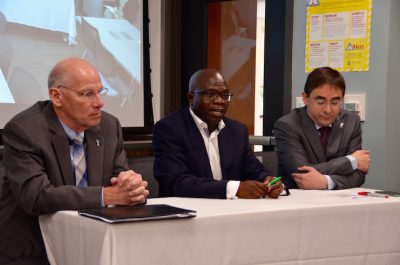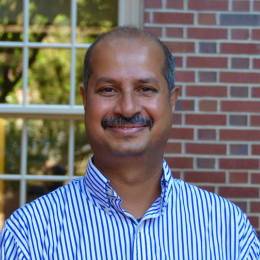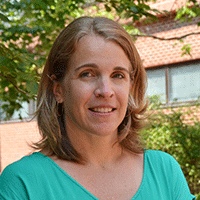UNC Gillings co-hosts conference to advance implementation science
May 17, 2017
Implementation science is, at its core, about solving problems. On May 4, students, faculty and researchers from across the University of North Carolina at Chapel Hill came together with representatives from the University of the Witwatersrand (Wits) in South Africa and King’s College London to share experiences with developing academic programs in implementation science.

Dr. Tobias Chirwa (center) shares his thoughts on implementation science education with the deans of UNC’s School of Pharmacy (left) and School of Education.
As consensus grows among researchers and practitioners that poor implementation of evidence-based practices results in unsustainable intervention outcomes, the field of implementation science is gaining popularity and prominence. Implementation science involves the study of systematic methods to translate research findings into clinical/programmatic best practices, and there is a growing realization of the urgent need to train the next generation of public health leaders in this approach.
To that end, the “Collaborations in Global Implementation Science Teaching” conference, co-hosted by the UNC Gillings School of Global Public Health and the UNC Institute for Global Health & Infectious Diseases (IGHID), explored the possibilities of a harmonized global curriculum.
Among the invited speakers was Tobias Chirwa, PhD, associate professor and head of the Wits School of Public Health in Johannesburg. He and other Wits faculty members have been collaborating with experts from UNC since 2014 to build implementation science capacity in South Africa and the broader African region.
Chirwa noted that, while there is agreement on the importance of implementation science, there is still no standard definition of the field.
“People feel like they are doing implementation science in multiple areas,” he said, “but there are variations in the academic understanding of what implementation science really is.”
The conference represented an international effort among collaborating partners to address this issue by highlighting the key principles and frameworks that underlie all implementation science education, irrespective of how the term is defined. Students shared presentations on various projects and methodologies that fall under the umbrella of implementation science, UNC faculty members described implementation science training programs, and a panel of deans representing the UNC Schools of Pharmacy and Education, as well as Chirwa’s University of the Witwatersrand, shared thoughts on how to build leadership in the field.
“We must collaborate between schools so we avoid double work,” Chirwa said. “If we build the field of implementation science together, we can move forward in a unified way. We need to develop core competencies that implementation science researchers can then adapt to their specific disciplines.”

Dr. Rohit Ramaswamy

Dr. Audrey Pettifor
Three universities in southern Africa currently offer master’s and doctoral degrees in implementation science, but a collaboration with UNC has enabled Wits to be the only university with a formal academic program in the field. Experts from UNC’s Gillings School, IGHID and School of Medicine have traveled to South Africa multiple times to co-teach implementation science courses with Wits faculty. In the Gillings School, this effort is led by Rohit Ramaswamy, PhD, clinical associate professor in the Public Health Leadership Program and the Department of Maternal and Child Health, and Audrey Pettifor, PhD, associate professor in the Department of Epidemiology.
Ramaswamy, who oversees the implementation science concentration in the Global Online MPH program at UNC Gillings, also is working with the World Health Organization (WHO) to promote implementation science teaching. A representative of the WHO’s Tropical Disease Research unit attended the May 4 conference at UNC, and Ramaswamy soon will travel to Geneva to discuss a harmonized global curriculum for implementation science with faculty from seven universities in Africa, Asia and Latin America.
“We will use our learning from three years of teaching at UNC and Wits to focus the global syllabus on the topics of greatest importance to field-based researchers and practitioners,” Ramaswamy said.
In Chapel Hill, meanwhile, implementation science is happening across the UNC campus. A symposium titled “Toward a Carolina Improvement Science Initiative,” to be held May 19, will feature the work of 107 faculty, staff and graduate students who are engaged in research and practice in diverse fields including health care, public health, nursing, social work and pharmacy.
Like the May 4 conference, this event will highlight expertise in a broad family of implementation and improvement approaches, with the ultimate goal of solving complicated problems that face the people of North Carolina and countries around the globe.
Gillings School of Global Public Health contact: David Pesci, director of communications, (919) 962-2600 or dpesci@unc.edu
